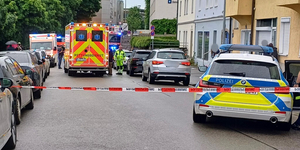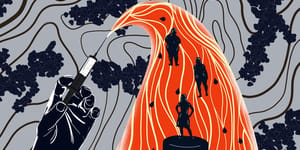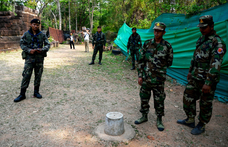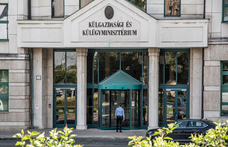There are certain similarities between The Network, a book co-authored by the recently poisoned Alexander Litvinyenko and the report produced by Krisztina Morvai's committee on the events of autumn 2006. Both works blame machinations by the political elites for outbreaks of mass violence.
The book by Litvinyenko and Yuri Felshtinsky blames the Russian Federation's Secret Services (FSB) for everything that has happened in the Soviet Union since the fall of Gorbachev in the Yeltsin and Putin eras. They blame the FSB for the outbreak of the war in Chechnya and blame the 'praetorian guards' of the FSB for preparing all kinds of terrorist actions. They claim FSB agents were behind bombings of apartment buildings in Moscow at the end of the 1990s. The agents supposedly wanted to pin the attacks on Chechens and prepare the population for a long-lasting, cruel war in the Caucasus. The two authors claim the FSB had longer-term plans. They wanted to choke off democratic initiatives that had emerged spontaneously after the fall of communism and place in power the strong, determined President Putin, a former KGB agent.
The Morvai committee blames not the secret services, but the political leaders in charge of the police, and Ferenc Gyurcsany himself for the way riots got out of control on the night of 18 September, and the way the siege of the TV headquarters almost became a tragedy. They write of a moral panic resulting from the leaking of Gyurcsany's Oszod speech. "The astonishing content and crude language of this speech were exacerbated by its self-centredness and narcissism, which many saw as pathological and sick."
Peter Gergenyi, the Budapest police chief, authorised the spontaneous demonstration in front of Parliament by saying it was an election campaign rally. The committee claim the number of demonstrators reached 50,000. "For the powers that be, demonising the demonstrators became a clear strategy. Another of their goals was to warn those who 'thought differently', those who were protesting against the government in the accepted fashion, drawing on their human right to do so. This strategy became evident on the night of 18 September 2006, when the TV headquarters came under siege," the report reads. It cannot be proven that commanders deliberately left the police in front of the TV building without support, but Jozsef Petretei and Ferenc Gyurcsany (who admitted he had spoken on the phone with Gergenyi) could have sent reinforcements to Szabadsag ter.
According to the report, the prime minister praised the police for their "exemplary" behaviour, encouraging them to act illegally. "Over the following days, a deliberate attempt was made to evince sympathy for wounded policemen, and to demonise the protesters and the entire Opposition, by highlighting the actions of a few dozen hooligans in a crowd of tens of thousands."
Just like the Russians, the Morvai Committee implies that the arms of state power created an effective "media package". They let the violence run out of control in order to serve their later political interest. The Russian authors wrote: "The Federal Secret Services managed to have their candidate elected President. Putin became president of Russia. A plaque commemorating Andropov in the Bolshaya Lyubanka, where the FSB have their headquarters, a toast with Zhuganov, leader of the Russian communists, to Stalin's health, bombings of apartment buildings, a law to allow investigations to be launched on the basis of anonymous denunciations, power for FSB generals and soldiers. Further - the suppression of the freedom of speech, the destruction of a constitutional order which, though fragile, was nonetheless based on democratic values and a market economy. These are just some of the achievements of Putin's first few months in power."
Krisztina Morvai and her committee are content with more modest conclusions. "The government's interest is not in promoting civil movements, but in exercising unlimited power over citizens. The proof of this is in attempts to shut down pressure groups and tightening up on the rules regarding the taxation of civil society organisations. Beside the kind of existential fear created by mental terror, on 23 October 2006 the horror of physical restraint or compulsion also returned." While it is welcome that independent lawyers have come up with a report, it is hard not to suspect that Morvai's document contains more than a few pre-conceived ideas, just like the Gonczol report.
Despite these two reports, there are still far too many points where the answers are unknown, where the role of the services are not clear, and where there nobody knows who was responsible for a given police action. We can only hope that more of these questions are answered as time passes, if only to prevent the re-occurrence of these events.
János Pelle














